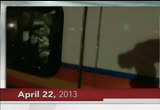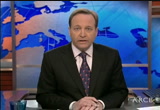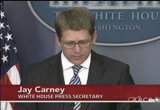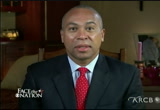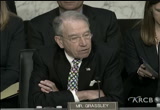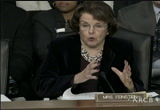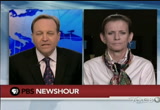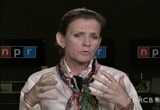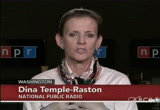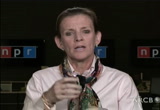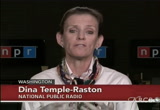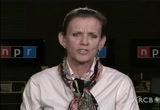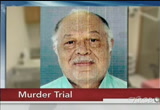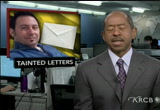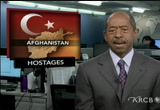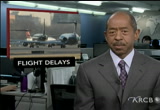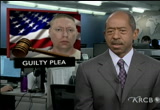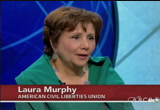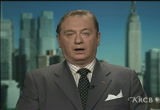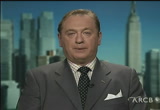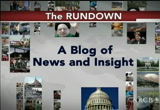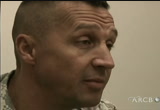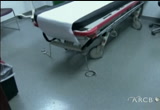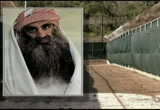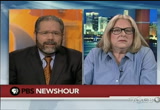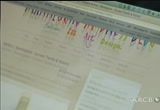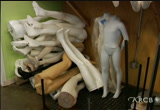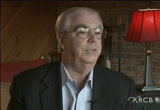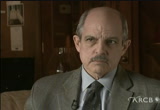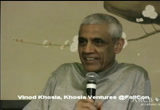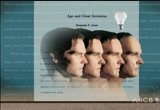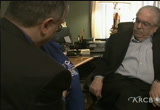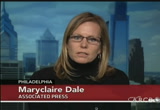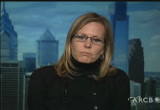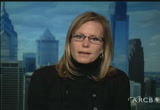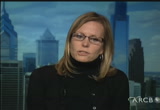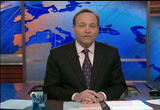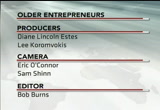tv PBS News Hour PBS April 22, 2013 10:00pm-11:00pm PDT
10:00 pm
captioning sponsored by macneil/lehrer productions >> ifill: the surviving suspect in the boston bombings was charged today with the use of a weapon of mass destruction. good evening, i'm gwen ifill. >> brown: and i'm jeffrey brown. on the "newshour" tonight, we update the investigation, both in the u.s. and abroad, into the two brothers believed to be behind the blasts, as the youngest remains hospitalized in serious, but stable condition. >> ifill: and we explore the legal questions raised by trying dzhokhar tsarnaev in federal court. >> brown: then, ray suarez gets an update on guantanamo bay, where more than half the
10:01 pm
prisoners are now on a hunger strike, protesting their indefinite detentions. >> ifill: paul solman has the story of older workers starting new businesses late in life. >> if you're smart and you realize you're getting older, well then, get into a business where you leverage the younger people and eventually you become the great gray god. >> brown: and judy woodruff looks into the trial of kermit gosnell-- the philadelphia abortion doctor accused of eight counts of murder. >> ifill: that's all ahead on tonight's "newshour." >> major funding for the pbs newshour has been provided by: ♪ ♪ moving our economy for 160 years. bnsf, the engine that connects us.
10:02 pm
>> and by the alfred p. sloan foundation. supporting science, technology, and improved economic performance and financial literacy in the 21st century. >> and with the ongoing support of these institutions and foundations. and... >> this program was made possible by the corporation for public broadcasting. and by contributions to your pbs station from viewers like you. thank you. >> brown: the chechen-american teenager accused in the boston marathon bombings now faces a possible death sentence. the filing of charges today officially moved the case into the federal courts, even as the city began returning to normal. dzhokhar tsarnaev was arraigned
10:03 pm
this morning, at boston's beth israel deaconess hospital, where he remained in serious condition. a short time later came word of the complaint, filed by the u.s. justice department. it formally charged the 19-year- old with conspiring to use a weapon of mass destruction, potentially, a capital crime, punishable by the death penalty. and, destruction of property by explosive device, causing death. tsarnaev had been able, sporadically, to answer questions in writing, but a gunshot wound to the neck left him unable to speak. it was unclear if he was read his miranda rights. but in washington, white house spokesman jay carney said he's a naturalized u.s. citizen, so he will not face a military tribunal. >> he will not be treated as an enemy combatant. we will prosecute this terrorist through our civilian system of justice, under us law. u.s. citizen can not be trialed, tried rather in military commissions. and it's important to remember
10:04 pm
that since 9-11 we have used the federal court system to convict and incarcerate hundreds of terrorists. >> brown: tsarnaev was also likely to face state charges in the shooting death of a police officer at m.i.t. it all followed his dramatic capture friday evening, when he was found hiding and wounded in a boat behind a home in the boston suburb of watertown. his older brother tamarlen died hours earlier in a shoot-out with police that triggered the all-day manhunt and shut down the city. yesterday, on cbs, massachusetts governor deval patrick stood by the unprecedented measures. >> i think people understood that we were making decisions in the face of a rapidly developing investigation and that we were making them in the best interests of people's public safety, or the public's safety. i think there won't be political backlash and frankly i'm not thinking about that anyhow. >> brown: in boston today, it was a time of remembrance and
10:05 pm
reflection. bells tolled as people observed a moment of silence at 2:50 p.m. the time one week ago that twin bombs exploded at the finish line of the boston marathon. elsewhere, friendand family gathered at st. joph's catholic church for the funeral service of 29-year-old krystle campbell-- one of three people killed in the bombings. a memorial service for another victim chinese graduate student lu lingzi was set for this evening. back in washington, president obama also observed a moment of silence at the white house as did the u.s. senate. but tempers flared earlier at a senate hearing. iowa senator chuck grassley was one of several republicans who've said the bombings, allegedly by two chechen immigrants, raise questions about immigration reform. >> i think we're taking advantage of an opportunity where once in 25 years we deal with immigration to make sure that every base is covered.
10:06 pm
>> brown: that sparked a heated exchange between grassley and new york democrat chuck schumer. >> i say that particularly those who are pointing to what happened, the terrible tragedy in boston, as i would say an excuse for not doing a bill or delaying it many months and years. >> i never said that. >> i didn't say you did sir. >> i didn't say anything about... >> i didn't mean you, mr. grassley. >> those remarks were not aimed at anyone on this committee or the three witnesses. there are people out there; you've read it in the newspapers; they've said it. >> brown: there were also questions about the f.b.i.'s investigation last year of tamerlan tsarnaev, after he spent six months in russia. senator diane feinstein, chairing the intelligence committee, said senior f.b.i. may testify tomorrow about why they did not pursue the matter further. i misspoke in that set-up piece.
10:07 pm
tsarnaev was read his miranda rights in his hospital room today. we're joined by a reporter who has been following developments closely. dina temple raston is npr as anti-terrorism correspondent. welcome to you. do we know how much or what investigators are learning from tsarnaev in the hospital so far? >> well, there's been very little that they've learnd because he can't really understand that he can't speak. he has a tube in his throat. he has some sort of a wound on his neck and his hand. apparently to his jaw. there's some question as to whether or not it was a self-inflicted wound. so as a result apparently they're writing notes back and forth. it's unclear if those notes are ra port building so he learns to trust these people who are trying to question him or where they're getting substantive information from him. >> brown: what can you tell us about the focus of the investigation right now? what do investigators see as the most important lead? >> well, one of the things is they can't really question the younger suspect, suspect number 2, the one with the white
10:08 pm
basketball cap on, until he is really lucid. because of that, they have concentrated their efforts on what his older brother was up to over the past sort of couple of years. you mentioned in your piece that there was a 2011 interview that the f.b.i. had with the older brother at the request of the russian government. they basically said they thought he had links to radical islamists in russia and wanted the f.b.i. to sort of investigate that. the f.b.i. couldn't find anything that he had done illegal. so they allowed him to leave. and then we subsequently learned that he went to russia last year. he was there for six months. what they're looking for now is what was he doing while he was in russia? was he training, for example? was he meeting with radical islamists who might have help red calize him. those are the threads they're pulling to try to put something a motive about what happened leading up to these bombings. >> brown: in response to the questions that have come about whether the f.b.i. did enough to check him out at the request of
10:09 pm
the russians, what's the response so far? >> well, you know, if he wasn't doing something illegal, there's only so much that the f.b.i. can do in terms of an investigatio they went to his house. they askd questions. apparently they had tea with his family but if he wasn't doing anything illegal they're not allowed to follow him. this has been the back-and-forth going on now. there's been finger pointing because this happened. they're asking why the f.b.i. didn't follow up. if he's not doing something illegal they're not allowed to follow him. >> brown: they're looking over there and looking in boston into the lives of these two. one of the questions is about the turn to religion, if you will, by tamerlan and the possible turn to radicalization by both of them. how much is known? >> well, what we understand -- and there was a great article in the wall street journal this morning that really pieced a lot of this together by a huge team at the wall street journal -- basically what we understand is that his mother became more devout. and then the older brother, tamerlan, sort of followed in
10:10 pm
her model and became more devout as well. and became quite radical in his beliefs. we know that he was visiting jihady websites. we know that he actually posted pro al qaeda or at least pro radical islam. what it seems to be -- and again this is very early days in the investigation and so, you know, they keep saying that in the early days of the investigation, you're almost always wrong when you jump to conclusions. but in these early days of the investigation it appears that the older brother had a tremendous amount or held great sway over the younger brother. and that the younger brother didn't seem to have any outward signs of this sort of radical islamic belief but followed in the footsteps of his older brother. so that's what investigators are going to try to find out when they finally get to talk to him in the hospital. as you mentioned in your piece, they did end up mirandaizing him, reading him his rights. there was some question as to whether or not they would use something called the public safety exception which basically
10:11 pm
says you don't have to read someone their miranda rights if you believe that the public safety is in danger. in other words, you know, if you thought that... if you read him his rights he might remain silent about co-conspiracies or bombs that might be elsewhere in boston or in the surrounding area. and i guess they made the determination that that was not necessary so they read himis rights right away. >> brown: a couple other areas of the investigation that continues. one, they're still looking at the bombs, right? bomb fragments that they pick up from the site. another one is that apparently federal investigators are trying to interview the older tamerlan tsarnaev's wife at this point. i gather get in touch with her attorney. >> yes. and in addition to that, i mean, they had more than just bomb fragments. what they found in the apartment and in the back of a car that they car jacked on thursday night was something that looked... bombs that looked very much like the fragments that
10:12 pm
they had found at the site... at the two bombing sites at the boston marathon. these were bombs with a low-grade explosive. we know this from the criminal complaint that was released today. the bombs were a low-grade explosive that were inside these rice cookers or pressure cookers. in fact, at one point during this car chase on thursday night, they actually lit one of these kinds of bombs and threw it at police. it became, you know, and it was partially exploded so it became more evidence in thease. >> brown: let me ask you finally briefly, one of the strange aspects to this, of course, is that in the days after the bombing it looks as though the two brothers went back to life, went back to business as usual? >> that's right. well, we know and we've been reporting for a while that the younger brother was tweeting. one of the last things he tweeted a j.z. lyric on wednesday and actually tweeted i'm a no sweat kind of guy or something to that effect. or i'm a no-stress guy.
10:13 pm
on wednesday he went to a party. he was hanging out with his friends. clearly they were trying to act as if nothing had happened. and clearly they didn't understand just how much surveillance there was around the finish line. what we found out is they have surveillance video that is very clear and seems to completely have the younger tsarnaev dead to rights on being there at the second bombing site dropping his backpack and having the bomb blast just minutes... just actually seconds later. >> brown: n.p.r.'s dina temple ras ton, thanks so much. >> you're welcome. thank you. >> ifill: legal questions raised by the boston bombing; a hunger strike at guantanamo, older workers starting new businesses and the murder trial of a philadelphia doctor. but first, the other news of the day. here's kwame holman. >> holman: police in canada say they've broken up a plot to derail a passenger train. they announced today two men have been arrested and charged
10:14 pm
with planning a terror attack. the suspects live in toronto and montreal, but are not canadian citizens. they allegedly had direction and guidance from al-qaeda, but the plot still was in the planning phase. >> while the r.c.m.p. believed that the accused had the capacity and intent to carry out these criminal acts, there was no imminent threat to the general public, rail employees, train passengers or infrastructure. >> holman: authorities said the plot had no connection to the boston bombings. so far, there's no sign of the poison ricin at the home of a mississippi man accused of sending tainted letters to president obama and a u.s. senator. paul kevin curtis has denied involvement with the suspicious mailings. at a hearing today, an f.b.i. agent testified a search found no ricin, or materials used to make it. a defense lawyer suggested curtis might have been framed. the death toll from six days of heavy fighting in and around
10:15 pm
damascus, syria has grown to at least 100. and, anti-government activists warned today the number could be closer to 500. meanwhile, dark plumes of smoke rose over the capital city as government troops pressed an offensive. they're trying to push back rebel forces. there was word today fierce fighting in northeastern nigeria killed at least 185 people over the weekend. the red cross reported the death toll, based on local accounts. nigerian authorities said the number was terribly inflated. the fighting erupted friday between government soldiers and islamist extremists known as boko haram. in afghanistan, the taliban took at least 11 civilians hostage after a transport helicopter was forced to make an emergency landing. officials said eight turks and a russian were among the captives. the civilian helicopter landed in strong winds and heavy rain in logar province. the taliban largely control that region. flight delays hit airports up and down the east coast today as
10:16 pm
1,500 air traffic controllers were required to take unpaid leave. airports in new york, philadelphia, baltimore and washington had delays of 15 minutes to two hours. in washington, transportation secretary ray lahood blamed federal budget cuts from the on-going sequestration. >> safety is not compromised. planes are guided by people, pilots and when you furlough some people there will have to be slowdowns and that's what we warned about months ago. >> holman: the federal aviation administration has ordered furloughs for all 47,000 agency employees. each employee loses one day of work every other week. flooding in the midwest eased slightly today, but prospects of more rain and snow melt raised concerns for the days ahead.
10:17 pm
the heavy rain of last week already has caused a number of swollen rivers to burst their banks. two levees failed early today along the wabash river in southwest indiana. crews also worked to recover more than 100 barges that broke free in the mississippi river. the flooding is blamed for at least three deaths. president obama will attend a memorial service thursday for the 14 people killed in the texas fertilizer plant explosion. white house officials said today the president already planned to be in texas, to lp dedicate the george w. bush presidential library. most of the victims in the explosion in west, texas were firefighters and medical technicians. a u.s. army sergeant pleaded guilty today to killing five other americans in iraq in 2009. sergeant john russell admitted he gunned down four u.s. soldiers and a navy officer at a mental health clinic near baghdad. at the time, russell was nearing the end of his third tour in iraq. the guilty plea means he will avoid a death sentence.
10:18 pm
folk singer richy haven has died. his family said he suffered a heart attack today. he came from the new york folk scene in 1960s. in 1969 he performed at the original woodstock festival, welcoming thousands of people to the event. richy havens was 72 years old. wall street managed to rally a bit today, after big losses last week. the dow jones industrial average gained 19 points to close at 14,567. the nasdaq rose 27 points to close at 3,233. those are some of the day's major stories. now, back to gwen. >> ifil: and we pick up on some of the legal questions being asked about the criminal case against against dzhokhar tsarnaev. if tsarnyev is found guilty as charged of using a weapon of mass destruction, he could face the death penalty. but what else does he, and should he face? for that, we turn to, david rivkin, who served in the justice department in the reagan and bush administrations. and laura murphy, director of the washington legislative office for the american civil
10:19 pm
liberties union. david rivkin, start by explaining to us what this means. using a weapon of mass destruction. is it a term of legal art? >> it is a term of art, gwen. good to be with you. it is obviously a manifestation of the seriousness of the attack. it is a charge that carries a death penalty, and i for one, given the wealth of physical evidence and evidence that the prosecution will be able to bring to bear, would be quite comfortable predicting that he would be convicted and sentenced appropriately. >> ifill: laura murphy, that term "weapon of mass destruction," is that relatively new kind of charge? >> yeah, that's in statute. congress created that term. it's a very broad term. and it's been broadly interpreted. >> ifill: is part of the broad interpretation what the penalty would be? >> i don't understand your question. >> ifill: as david rivkin just said part of the reason why that
10:20 pm
kind of charge is brought is because it makes you liable for the death penalty. >> well, we don't know whether the federal prosecutors are going to charge this suspect with the death penalty. so it is a prosecution that can result in a deat sentence. >> ifill: let me ask you and then david rivkin this question, were there other options besides this particular charge for charging this young man? >> oh, there are many options. but we don't know that the charges that are brought have been completed. this individual could be prosecuted in state court. this individual could face further federal charges. so this, by no means, means the end of the charging process. >> ifill: david rivkin, what else could you imagine that he could be charged with based on what we know. >> if i may, gwen, it's not just a question of what he will be charged with. there are other charges i agree with my colleague about the possibility of state prosecutions. i think what's important, this
10:21 pm
administration has made a serious mistake is not considering, completely taking off the table, the possibility of classifying him as a potential enemy combatant and subjecting him to the interrogation process that would have frankly yielded a lot more in terms of intelligence than the standard criminal justice type interrogation process. it has nothing to do with miranda on which everybody has been focusing. it is simply the case that an interrogation process that would last for a period of weeks and maybe months and enables the interrogation team to develop without any interruptions a full intelligence take. it is not something you do in a criminal justice system because once he's charged, he's entitled to a lawyer. and his lawyer, even if he does not tell him not to cooperate, you just wouldn't be able to structure the interrogation in the same process. that's a loss. that's very unfortunate. >> ifill: laura murphy, in fact, he has now been assigned a lawyer. this enemy combatant option was pretty vigorously taken off the
10:22 pm
table today by jay carney at the white house. what did you think about that? >> we thought it was an excellent idea to prosecute this individual in the criminal justice system in our federal courts. >> ifill: why? because the enemy combatant status does not allow for due process, does not allow for right to counsel, does not have the same presumption of innocence, and we hold our system out to the world as being the model for justice. that is a very different secretive process. in fact, john brennan, who is now the director of the c.i.a., when he was national security advisor argued against holding people as enemy combatants and in military detention for the purposes of interrogation because he cited at least three major terrorism cases where the individuals were tried under our federal criminal court system and they cooperated even after having counsel. and this system, this criminal justice system of our federal
10:23 pm
government, has prosecuted over 400 terrorism-related cases. you have the blind sheik in custody. you have masowi in custody. you are terry nichols who was part of the oklahoma city bombing. you have eric rudolph who was part of the atlanta terrorism bombing related to the olympics. so there's no problem in our criminal justice prosecuting alleged acts of terrorism. >> ifill: what about that, david rivkin? >> let me just jump in. this is a strawman. nobody is suggesting that dzhokhar can not be prosecuted in the criminalustice system. but prosecuting him is just part of the equation. the real question for us is this: this is not just an act of terror. this is an act of war. at least potentially an act of war on the theory that his brother was inducted in al qaeda affiliated entity and he came back during his stay, he came back to the united states and inducted his brother.
10:24 pm
>> ifill: so far we know that all to be a theory, right? >> of course. that's the whole point. the whole point of enemy combatants is that you hold people and you build information in part based upon interrogation results. by the way a point made my colleague. there's nothing wrong with the military justice system. if she feels otherwise she should take issue with the supreme court. the supreme court in a number of decisions prior to 9/11 and after 9/11 in a case called hamdi very much affirmed the constitutionality and violate of the laws. i'm not suggesting by the way... forgive me just one second. i'm not suggesting he would have been prosecuted in the military commission. the existing law does not allow for it. it specifically is off the table. but he could have been interrogated and held for a number of months as an enemy combatant and just like happened to others, he could have been transferred to the criminal justice system to be prosecuted.
10:25 pm
>> ifill: excuse me. since we no knew that is not going to happen and the administration has made very clear what their approach will be i would like to focus on the challenges now ahead for the prosecutors and for the defense in a case like that. laura murphy. >> first of all, they have to get their facts together. we just don't know what the facts are in this case. we cannot say that this individual agreed with his older brother's ideological beliefs. we don't know that. so this person has counsel. counsel is going to meet with this person to make sure that the charges are fair and build a case based on the facts. we can't predict how this case is going to go. we know that the federal government has to conform with rules of evidence and we think that they are going about this
10:26 pm
prosecution in the manner that really comports with our american values and our constitutional rights. >> ifill: david rivkin. 'm surprised actually to hear you say that because quite frankly in an effort to avoid dealing with the option that i mentioned by not mirandaizing him, they have actually created some problems for themselves. >> he was mirandaized. ifill: as of today when he was charged he was. >> yes. ifill: but there was a delay, you're right. >> there was a delay. i agree with professor who points out the danger of this kind of a blending of two paradigms because he was not mirandaized initially it may be difficult for the prosecution... lots of physical evidence, as i said. but as far as his state of mind, as far as what made him do this -- and i agree with laura, there might be some difficulties which again underscores the proposition that you pay a price when you take some options off the table. you make other options more difficult for you. >> ifill: even though he wasn't
10:27 pm
mirandaized right away and was in communication with the investigators are you okay with that? >> no, we're not okay because we don't know the facts. we don't know what he was compelled to answer. we don't know whether he knew what was going on, whether he was of sound enough mind. we think the public safety exception should be very, very limited. we don't know whether they abused the public safety exception. we're not prepared to say everything is okay just because he's been mirandaized but we are relieved he's being tried in federal court and that he was mirandaized. >> ifill: laura murphy of the american civil liberties union and david rivkin, thank you both so much. >> thank you. >> brown: we turn now to the detention center at guantanamo bay, cuba, where a protest by prisoners continues to grow. ray suarez reports.
10:28 pm
>> suarez: more than half the detainees at the guantanamo prison are now on hunger strike. government figures disclosed this weekend show that 84 of the 166 captives at the facility are now participating. a smaller number began the protest in early february. they objected to their living conditions, and to alleged mishandling of the koran by military guards. they also cited the legal limbo many have been held in for a decade or more, not charged with crimes or placed on trial. on april 13, there was a brief, violent confrontation. the military said guards raided a communal area to uncover security cameras and windows that had been shrouded for weeks. >> we were trying to be patient and work with them and give them the opportunity to comply. we hit the point where, you know, i felt we were accepting too much risk and it was time to take action. >> suarez: the guards say the
10:29 pm
prisoners attacked them with homemade weapons. there were no reported serious injuries, but the prison was put on lockdown, and the number of hunger strikers skyrocketed. 16 are being force-fed, with tubes inserted through the nose and into the stomach. they are typically shackled in chairs like this for the procedure. an american naval medical officer described the process in 2009. >> these are the feeding tubes that we use, whenever it is determined at a very high level. everyone is allowed to hunger strike; that is their right to protest. if somebody gets to that point where they need additional medical care or threatening life, that'shere the decision is made-- way above me-- to step in. >> suarez: among those being force-fed is samir naji al hasan moqbel of yemen. in a recent "new york times" op- ed, told to his lawyers through an interpreter, he wrote:
10:30 pm
in all, 86 men remain at guantanamo, who have been cleared for release from the facility, 56 without restrictions; another 30 with conditions. all this, despite the fact president obama signed an executive order to close the military prison at guantanamo bay, more than four years ago. but congress has blocked the transfer of any detainees to the mainland u.s. and some, like the yemeni moqbel, are men without countries: their native nations have refused to take them back. several high-level al qaida detainees, like 9/11 planner khalid sheikh mohammad, are among the f facing military trial at the prison. for more on the hunger strike, i'm joined by a reporter who's logged more hours in guantanamo than any other journalist, carol
10:31 pm
rosenberg of the "miami herald." carol, welcome. more than a dozen are now being force-fed. how is the determination made which prisoners are restrained and fed by force? >> the military says they have a calculus that looks at how much weight has been lost, how much malnutrition exists in an individual, and basically how sick they are. they can skip meals for days on end, but there's a point at which when their weight drops down to a certain percentage below healthy body weight that they start the force-feeding. >> suarez: of the scores who are on hunger strike, how long have the longest prisoners been denying themselves food? >> well, ray, there's one man down there who has been doing this hunger strike since about 2005. he's been living off these tube-feedings for years and years. this has been a singular protest. what's going on now is that this current hunger striker, hunger
10:32 pm
strike started probably in february. when the detainees say that they had a particularly aggressive search by the guards in which they perceived that the guards were having the link quist inspect their korans which apparently uncorked all sorts of frustration and led to this latest hunger strike. >> suarez: are there in the international treaties that govern the way prisoners are treated areas that -- parts, chapters, whatever -- that cover force-feeding? >> well, you know, the head of the international red cross tells us that they oppose force-feeding. actually prisoners do have the right to a certain measure of self-determination. one of the things that they can do is choose not to eat. the pentagon has a different policy. what they say is that they've developed these force-feeding protocols from the federal bureau of prisons years ago when
10:33 pm
they were first confronted with the hunger strikes. so there are international human rights and medical organizations that say what the u.s. is doing down there, feeding them twice a day with these tubes tethered up their nose, down the back of their throat and into their stomach, twice a day, there are organizations that say this is wrong, that they should be allowed to choose to starve to death if they want to. >> suarez: recently there was a raid in the prison itself. what were the conditions that prevailed in the so-called communal areas? what had the authorities at guantanamo allowed life to become for many of the detainees? >> this raid took place in the show case communal prison, camp 6. this was a place where... which was closest to a p.o.w. camp than anything that had ever existed at guantanamo. detainees lived in groups of 10, 12, maybe 18 at a time. they ate together at picnic
10:34 pm
tables. they prayed together. they were able to sit around and watch television together. they had free movement from inside the building where the picnic tables were out to enclosed recreation yards outside. so this was a fair amount of enclosed freedom with the guards on the outside looking in. they would watch through cameras, monitors and they would watch from outside the fences. some of them which were actual fences. what we were told when we went down there last week is that the detainees began to defy their guards in many, many ways over the months. among other things, i was told last week to my surprise because i had been there the month before, some of the prisoners had taken sticks and were poking the guards through the fences. you know, they had brooms there which they could use to sweep out their cells so they apparently took these broom sticks and were poking the guards and provoking them. they refused to eat. they refused to allow the food carts to come inside these communal areas. they controlled what came in and
10:35 pm
went out. most importantly, they took old cereal boxes and they covered up the cameras in their individual cells. and this was the thing that most concerned the pentagon and the military that was running the place. if they couldn't look inside individual cells, if they coun't keep an eye on detainees in the corners of these collective areas, they feared that somebody would try a suicide or somebody was starving himself and wasting away and that they couldn't keep eyes on him to realize that they had to force feed them. so they made a decision after several months of this kind of defiance of the rules, they went in on april 13 right before dawn with these strike forces. two of the teams had shotguns with rubber pellets. they all had shields and they had helme. they charged inside the recreation yards where according to the military they might some resistance. it wasn't long. they described injuries to both
10:36 pm
sides that were not serious, but people on both sides got hurt. and the guard force came in and pushed each one into individual cells. they are now in lockdown. they are now inside these roughly 8x12 cells, up to 22 hours a day being moved and shackled from these cells to small recreation yards, being moved from these cells to showers. they have lost the ability to control their lives inside these communal blocks. they're in what they call lockdown. it's a very different guantanamo than the one we had seen throughout much of the obama administration. this is much more of a doctrine of keeping people in individual cells similar to what went on during the bush years. >> suarez: carol rosenberg of the miami herald, thanks for joining us. >> thank you, ray. >> brown: online later tonight, you can see additional excerpts from ray's interview with carol rosenberg, including more on those 86 detainees, cleared for
10:37 pm
release, who remain at guantanamo. >> ifill: now, economics correspondent paul solman reports on late-blooming self-starters. it's the latest chapter in his look at older workers in the american economy and all part of his on-going reporting "making sense of financial news." >> look at this nice, tight stomach with the abs which you could grate cheese on. >> reporter: at 55, judi henderson-townsend is working with a much younger crowd. >> it's like living in the land of dorian gray here. nobody ever ages. >> reporter: after a career spent working with stiffs in the corporate world, says townsend, she started mannequin madness. >> i sell mannequins, i rent mannequins, i repair mannequins, i blog about mannequins. here in our warehouse, we recycle them for the stores for free and then we resell them or rent them to other people. >> reporter: so you mean all those good looking folk back there were going to be dumped.
10:38 pm
>> those were going to be tossed into the landfill because the store didn't need them anymore. there just maybe a few years old, but structurally nothing is wrong with them. it's like having a pre-owned lexus. >> reporter: townsend thinks she's modeling a trend: the rise of the mature entrepreneur. and indeed, since 1996, the share of businessowners age 55 to 64 has grown more than 9%. and whereas just one tenth of the total u.s. workforce is self employed. >> you look at workers in their mid 50s, it's 15%. you look workers 65, 66,7, 68, you're up at 25%. >> reporter: university of southern california economist julie zissimopoulos has studied oldish entrepreneurs. >> they're more educated, they have higher income and wealth. they are more willing to take on risks. they've had lots of on the job training, lots of workforce experience.
10:39 pm
they can bring all of this into the development of a new business or a new service. >> reporter: townsend's penchant for dummies began as a hobby. she looked on craigslist for a mannequin to put in her garden, ended upuying 50 of them, and started renting them out as a side gig. soon her unlikely business was booming. so the longtime sales executive decided to give full-time self- employment a try. >> i think being the age i am is an advantage. number one, i would have never had the confidence to step out on such a crazy venture like this in my youth. and also because i bring a lot of my previous experience. it's just about marketing and sales right? i just happen to have a kind of an unusual product. >> reporter: it's taken plenty of legwork, but mannequin madness now sells or rents more than 200,000 bodies and limbs annually and is an environmental leader, recycling 100,000 pounds of non-flesh a year. one key to growth: marketing the mannequins online with help from
10:40 pm
consultant cynthia mackey. >> what i like to recommend is know where your audience is and what do they like to do online? so with you, pinterest has been wildly successful. >> reporter: now you might expect the social media guru to be on the young side. but mackey too is in her 50s, as is the target audience for her business. >> baby boomer business owner workshops, and they're designed to help those who are non- technical or feel overwhelmed by tech to do their jobs better online. >> reporter: cynthia mackey is capitalizing on the late bloomer self employment boom, self- employed herself, she knows the draw. >> you're not working for someone else and you get to take that value for your benefit, if i want to take my mom out for breakfast, i can schedule that and then work longer hours in the evening. so having control of my time or the ability to schedule things, that that's wonderful as you get older i think. >> reporter: but not everyone chooses self-employment.
10:41 pm
to many, the great recession offered few other options. >> on my 65th birthday my boss comes into my office and tells me i'm no longer needed and that was not the birthday present i expected. >> reporter: michael grottola was one of thirty senior level employees cut loose. the outplacement counselors advice? >> he said, mike, there are just so many thros d there's too many princes. that's the state of our economy in 2009. and he was in no way encouraging that i should even try to look for work. the grey hair, the high salary, all that stuff. i mean, they can't say those things but don't tell me they're not thinking those things and that's how the real world is. >> reporter: with a wife and two adopted daughters to support, grottola couldn't just hang it up. so he decided to go it alone, founding m.g.g. consulting to
10:42 pm
advise other small businesses. >> hanging up a shingle and rolling your own business and opening up the bank accounts, and getting the company name, and promoting, and all that stuff is not for everybody. but, if it's for you, it's a lot of fun. i had no job, no money, no customers, no nothing and toda i have 40 clients. i've hired someone full-time. i've grown, but it's been hard work. >> reporter: how old is too old? >> i think i can do this until 80 or 90, alright, and the reality is i don't think you can think in terms of too old. it's how you feel, it's how much fire you have, and if you're smart and you realize you're getting older, well then get into a business where you leverage the younger people and eventually you become the great gray god. >> reporter: marc freedman runs a non-profit called encore.org. he has long seen entrepreneurship as an answer to
10:43 pm
the challenges posed by the mass of ripening boomers approaching traditional retirement age. >> as a society we need to take the full productive potential of this population and use it in ways that will help everybody benefit. especially as the demographics change, you cant just have 30 or 40 year retirements and so these entrepreneurs and the others who are working longer are fashioning a new stage of life that's much more sustainable. >> reporter: but others doubt that older entrepreneurship is the answer. >> i find that people fundamentally stop trying new things after the age of 30. >> reporter: silicon venture capitalist vinod khosla: >> after 45, people basically die. ( laughter ) >> reporter: khosla was being provocative, says he invests in several firms run by folks over 45. but freedman says he's voicing the conventional wisdom: that, after a certain age, folks are
10:44 pm
thought to be well past their useful prime. >> it turns out that creativity has a life that's very different from the popular assumption. cezanne's mo valuable work is done in his late 60s. louise bourgeois, the great sculptor, does her most valuable work in her 80s and economists have shown over and over again that there is this late blooming burst of creativity that i think is showing up not just in the arts, but also in entrepreneurship, in social innovation and i think it raises the question that an older society doesn't necessarily have to be a less innovative one. >> reporter: in fact, one much- cited study showed the average age at which people produce great innovations has risen substantially over the last century. encore.org was founded to encourage innovation awarding the annual purpose prize to seniors doing social good.
10:45 pm
>> they don't set out with a grand notion and identity as entrepreneur. they set out a step at a time to solve a problem that's in front of them and in many ways leads to very creative new ventures. >> reporter: mike grottola's client paul jetter, for example. his business was inspired by compassion for his father. >> one day he was driving to work and he became disoriented, and even though he's worked every day that i have known him he decided that he could not go in. >> reporter: at 85 he had alzheimer's. a common symptom of the disease: wandering. >> i looked into what were the programs out there for wandering and nearly all of them required that you wear a bracelet whether it's tracking or an i.d. and i knew he would not wear a bracelet. >> reporter: so, with a little help from grottola, jetter is setting up safely back home, to make garments to help identify and find quick care for lost loved ones. a second career at age 59.
10:46 pm
>> not your typical kind of mannequin, of course. more like a paper doll. >> reporter: thanks to judi henderson-townsend's rental business, senescent fashion models are getting a second life too. >> i've given them an opportunity to have an encore career. we're seeing that with seniors, right? they still have a lot of great things that they can contribute but they're old. >> reporter: old, sure, but with vision and a body of work to draw on, not too old to start something startlingly new. >> ifill: online, judi henderson-townsend describes the unusual reasons customers need mannequins. you can also find tips for senior entrepreneurs. that's on our making sense page. >> brown: finally, the murder trial of an abortion provider that has captured national attention. judy woodruff has the story.
10:47 pm
>> woodruff: a judge and jury in philadelphia began hearing testimony in the case of doctor kermit gosnell more than a month ago. but over the past two weeks, the trial has received more coverage from national news organizations after both sides of the abortion debate began fighting over its significance. gosnell is being tried on eight counts of murder-- seven of them for allegedly killing babies that prosecutors say were born alive and viable. the eighth count is for his role in the death of an immigrant from bhutan. attorneys say she died of an overdose from a sedative she was given. the case stems from an f.b.i. raid on his philadelphia clinic in 2010. investigators found horrific conditions and say he performed some abortions after the 24-week legal limit in pennsylvania. gosnell's defense is scheduled to begin this week and observers are waiting to see if he will testify. reporter mary claire dale of the associated press has covered the
10:48 pm
trial since it began. she joins us tonight from pladelphia. welcome to the program. mary claire dale, first of all, tell us what are the charges against dr. gosnell. >> good evening. the charges include eight counts of murder, seven of them are first-degree murder and could bring the death penalty. those are the charges involving the babies who were allegedly born alive. the 8th murder count is a third-degree murder count involving the overdosed death of the 41-year-old patient. >> woodruff: and this all stemmed as we said from investigators coming into the clinic aew yars ago. they were actually looking for something else. >> yes, indeed. they were responding, we think, to a tip about drug, prescribing of prescription drugs including oxycontin. he was apparently one of the more high-volume prescribers in the state of pennsylvania. the raid was intended to examine that.
10:49 pm
allegedly was freely writing prescriptions for addicts and drug dealers, et cetera. but what the f.b.i. and other federal and state authorities stumbled upon when they were there was that abortions were going on that evening. they were expecting to arri at the clinic in the evening and find that they were hoping that they would not encounter the abortion going on. they didn't want to interrupt that. but, in fact, gosnell tended to perform the surgeries that night after the patients had been there during the day. they found, they said, very unsanitary, filthy conditions. somewhat macabre findings including fetuses that were stored in the freezer. during the trial we learned that that was perhaps because in a billing dispute with his medical disposal company and had nowhere o... they were not being picked up. so that actually provided evidence for prosecutors. they could perform autopsies and, you know, learn whether or not they believed the babies were late-term. you know, conduct other
10:50 pm
investigation on the findings in the clinic. >> woodruff: in fact, much of the testimony has been pretty graphic. what kinds of things have you been hearing, including from his former employees? >> right. much of the prosecution testimony does come from former employees. eight of whom have pleaded guilty in the case. three of them indeed pleaded guty t third degree murder and await sentencing. of course, they will get credit for their cooperation. they've testified to a number of things, including about themselves that they were often unlicensed or untrained. some of the women who were doing i.v. drug administration as well always ultrasounds and indeed assisting with abortions had merely a few months of training from a medical... to be medical assistants. another young woman was a 15-year-old teenager when she began working there. through some sort of a school externship program. she too came to work in the procedure room. and then there were two unlicensed doctors who were working there.
10:51 pm
one who dealt mainly with non-abortion patients. often geriatric patients who were there just for basic medical care. but another steven massof who has testified that he himself performed many of these abortions and he admits that he killed babies after they were born alive. >> woodruff: some of the testimony has been about that, about babies being born alive and then being put to death there in the delivery room. >> right. that is true. so the jury has heard quite graphic testimony in addition to some photographs that employees took, some cell phone photographs and other photographs. of course we have the investigative photographs of the clinic and some of the fetuses that were found that night. the testimony is quite jarring, but there was about two weeks of jury selection. and the judge did make sure that he found jurors who thought that they could tolerate that. and still judge the case fairly.
10:52 pm
>> woodruff: what are you expecting? i know the defense is supposed to be getting underway. what are they expected to say? >> well, much of the defense has really already been taking place on cross-examination as is often the case in trials. the defense lawyer for dr. gosnell, jack mcmahon, has argued through his questioning and through his opening statements that there were no live births at the clinic in his view of the case. he says that staff members who saw babies or thought they saw babies move were merely witnessing some involuntary responses amid the death process. so that is his argument to the staff testimony. also in opening statements prosecutors had said that they would be able to prove at trial that from the fetal remains that two babies took a breast based on the autopsies but when the medical examiner for the city of philadelphia came on, he stopped short of being able to confirm that. he says that he actually could
10:53 pm
not confirm that because of the deterioration of the cells once they were able to do the autopsies on some of these borted fetuses. so the defense is, you know, plans to also bring character witnesses. we are not yet sure whether dr. gosnell will testify. he did do an interview while he was under investigation. he did a media interview. he seems not shy about talking. so we'll see. we expect that he might well come on. >> woodruff: mary claire dale, one final question. we mentioned the dispute about the media's focused attention. how much media attention has there been on this trial? >> there was quite a bit when the grand jury report came out in 2011. that was almost a 300-page report. there was both local and national media. and there has been coverage throughout the trial. there was more once there was some back-and-forth about whether enough media outlets were covering it. the one thing is cameras are not allowed in courtrooms in the state of pennsylvania. there's a gag order in this trial which prevents lawyers from speaking outside the
10:54 pm
courtroom so it is a bit tough for broadcasters to, you know, get the kind of footage that they typically might wish to get. there are more people here now covering the trial. so we'll see from here on out. >> mary claire dale covering the trial of dr. kermit gosnell in philadelphia. thank you very much. >> thank you. >> brown: again, the major developments of the day: the surviving suspect in the boston bombings was charged with the use of a weapon of mass destruction-- a federal crime that could carry the death penalty. police in canada announced they've broken up a plot to derail a passenger train. they said they arrested two men who had guidance and direction from al-qaeda. and, flight delays spread across the u.s. as thousands of air traffic controllers were furloughed for a day. the f.a.a. blamed federal budget cuts. >> ifill: online, we take you inside one of the world's greenest buildings. kwame holman has the story.
10:55 pm
>> holman: in honor of earth day, we look at seattle's new bullitt center-- the building boasts the world's first six- story composting toilet system. learn more about the project from our partners at kcts 9 and earthfix on our homepage. and author erica brown says, in preparing for death, shouldn't your survivors inrit more than just your finances? she advises creating an ethical will to pass along wisdom and life lessons to younger generations. find that story on our health page. all that and more is on our website newshour.pbs.org. gwen? >> ifill: and that's the "newshour" for tonight. on tuesday, we'll examine how cuts to federal spending are slowing down the airline industry. i'm gwen ifill. >> brown: and i'm jeffrey brown. we'll see you online and again here tomorrow evening. thank you for joining us. good night. >> major funding for the pbs newshour has been provided by:
10:56 pm
>> and with the ongoing support of these institutions and foundations. and... >> this program was made possible by the corporation for public broadcasting. and by contributions to your pbs station from viewers like you. thank you. captioning sponsored by macneil/lehrer productions captioned by media access group at wgbh access.wgbh.org
108 Views
IN COLLECTIONS
KRCB (PBS) Television Archive
Television Archive  Television Archive News Search Service
Television Archive News Search Service 
Uploaded by TV Archive on

 Live Music Archive
Live Music Archive Librivox Free Audio
Librivox Free Audio Metropolitan Museum
Metropolitan Museum Cleveland Museum of Art
Cleveland Museum of Art Internet Arcade
Internet Arcade Console Living Room
Console Living Room Books to Borrow
Books to Borrow Open Library
Open Library TV News
TV News Understanding 9/11
Understanding 9/11
